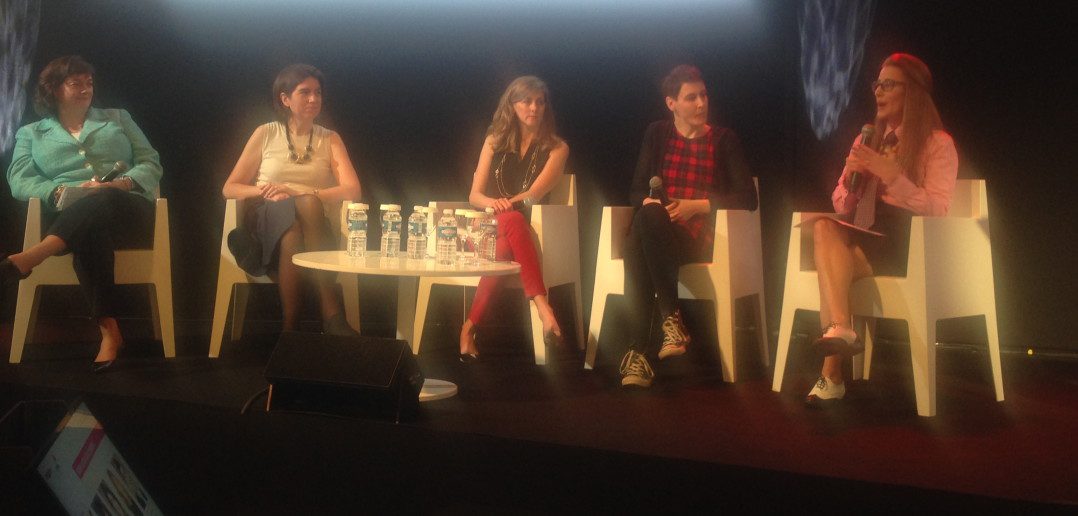Left to right: Vicki Huff, global leader of technology, communications, entertainment & media practice, PwC (event sponsor); Orla Noonan, managing director, Groupe AB & independent director, Iliad; Marci Weisler, co-founder of SWSI Media; Sarah Wood, co-founder & COO of Unruly; and moderator Catherine Warren, president of FanTrust Entertainment Strategies & board member of the Bell Fund.
This morning’s Women in Tech & Media Breakfast panel kicked off with a rousing opening talk from moderator Catherine Warren.
“Companies with zero female board members don’t just slap our faces; they slap the face of logic,” Warren said. “Companies with more women on the board are widely known to outperform counterparts in Fortune 500 companies: They have better returns on equity, sales, and invested capital.”
Warren concluded, “Ultimately, what is bad for women is bad for business.” She later added, “If you have only one woman on the board, you’re at a disadvantage because the company feels the work is done!”
Panelist Noonan said a law recently passed in France: By 2017, executive boards must all be 40% women. “We’ll bring them in, even kicking and screaming,” she laughed.
“But there’s a lot of work to do in the education side of things. In France, education is very maths-focused. 46% of young girls are doing that because it’s what you do as a good student, but when you count the women in prestigious engineering schools, that figure drops to 26%.”
Wood agreed. “If you look on the tech side, where there’s a real disparity, there are real efforts in education to get girls into STEM, coding and learning,” she said. “The perspective women are bringing are helping to change what’s just coding for coding’s sake.” Additionally, she’s seen a shift in the last three to five years: More women are joining the digital workplace.
“We’re living through this amazing transformation of an industry that has knockout effects on all other industries,” Noonan said. “In this industry, 27% of employees are women.”
SWSI Media’s Weisler shared a recent effort on her part to draw more women into the upper professional echelons. “We launched our first show, a reality competition for female entrepreneurs, with the goal of getting funded and going big,” she said. “It’s a Shark Tank meets mentorship meets crowdfunding. The goal isn’t to get investment from the judges, but more to learn and grow your businesses. The crowd can also back your company.”
The contest ended with a surprising twist: “We had great entrepreneurs in first run, but the one selected by the judges was different from the most crowdfunded one.” This brought her to her next point: The growing significance of crowdfunding in the disruption of whole industries and business models. It’s utterly changing the face of who gets to compete in the larger marketplace.
But it relies quite heavily on your ability to cultivate a network. “If you don’t have your own network, you can’t fulfil that crowdfunding,” Weisler said. “I’m excited about the possibility of building that network where programming can help women start businesses.”
“Women dominate social media for all networks except for one, which is LinkedIn, and that to me is a depressing statistic,” Noonan added. “As women, we need to use our networks professionally.”
Huff observed that in a recent Millennial competition, women were actually more creative about thinking up different types of social networks than men were, which she sees as a huge opportunity that we may miss entirely. “Networks are the way of the future, and these digital natives get it,” she said, making it crucial to empower women. “That’s the opportunity.”
The panel then turned to the future, and what we could do to improve the state of things.
“If you’re in a startup or tech environment you can be complacent, you can assume that the old prejudices don’t exist anymore,” said Wood. “These are unconscious biases. Everyone, whatever the sector, needs to be reflective and self-aware. One thing I’ve been doing is experiment in non-gendered compliments. I’ve been complimenting guys in the way that I compliment women! And I’ve gotten interesting responses.”
Asked for an example, she described how she might tell a man his shirt looks great, especially with that one button unbuttoned up top. The result is tangible: “They look uncomfortable, disempowered, like they want to run in the other direction! And I wonder if we do that to women” when we speak to them like that, she concluded.
Noonan also pointed to the importance of supporting men in childcare roles. “When women decide to have the first child, that’s really a motivating moment,” she said. “I want to say it gets better, don’t step back now. It’s then that they need support. If dads can plough in and relieve women at that point, that would make a huge difference in female progression. It’s the hardest point.”
In general, said Huff, “Women need to support women publicly and loud. I think it makes a difference and I don’t think we do it enough.”
Noonan admonished the audience to “Get involved in organisations, support groups and networks. And get involved in your daughter’s maths education!”
“Mentoring and working with younger women who are coming up” are helpful, said Weisler. “Take the time to participate in those types of activities and tell those success stories.”
“I agree with all these,” said Wood. “Just to add to that, we need to be kind to ourselves and each other. We can be tough on decisions we make and we judge each other harshly as well. The kindness can really help.”
“I’d like to do more deals with women,” Warren decided. “I’d like my clients to do more deals with women. I’d like the deal-making dynamic to change as a result.”
The panel then opened to questions. A notable one included a young woman in college, who asked the experts what they’d tell their 20-year-old selves.
“Courage,” Wood emphasised. “There’s no ability gap. You will be awesome. It’s just courage. Take the deep breath and go for it!”
“Enjoy the ride and don’t be afraid to put your hand up,” said Huff.
“Life takes different turns and may not go the path you think. Be willing to go those ways,” Weisler advised. “Also, ask for things you want. That’s the one big thing—tied to that pay gap, a lot of women don’t ask for what they want. Don’t think you need to have every criteria; just go for it.”
“Seize opportunities,” said Noonan. “The most confident women won’t necessarily say ‘this is for me’ and you’ll get three guys who are not perfect for the job up there saying ‘yeah, I can do this!’”
And for more seasoned women who are already in a position to make a difference in their current workplaces and communities, Huff advises, “We are in a war for talent. That’s why the developing skills of women are so important. You can see the knowledge worker drain. But it has to be a business case. If there isn’t one, you’re not going to get there.”
“In politics as well, women need to make it a voting case,” Noonan added. “We need to want women elected, to have as many votes as the men.”
Wood concluded with something that provided a glimmer of hope, especially in a world where social media can be punishing and ugly toward women who transgress.
“Social media has changed a lot and brought a lot of misogynistic opinions forward,” she said. “In one way it’s been depressing. But in another way it’s been great. When you see it, you can name it, you can shame it. Across social media so many young women are standing up and saying ‘No, feminism is not a dirty word!’ and ‘We will call you out if you behave badly’. I think that does bode well for the next generation.”
Check out MIPTV, MIP Digital Fronts, MIPDoc & MIPFormats 2015 full live coverage




